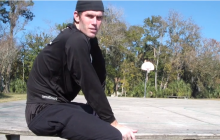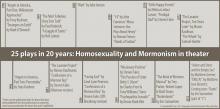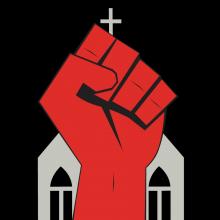Culture

Editor’s Note: The following poem by Trevor Scott Barton was written while he was living in Africa and reading The Little Flowers of St. Francis of Assisi.
Holding you in the palm of my hand
I see your tiny feet and hope you'll live and walk these stony paths
To the pump to get water.
Blessing you in your meekness and gentleness,
You are Jesus to me today.

Mumford and Sons opened with a little introit called "Sigh No More" then a call to worship, "Roll Away Your Stone" and so we did. Understated and, dare I say it, reverent. Polished and yet still "honest" (this is a hipster liturgy, after all), the boys did a great job offering their work to us. They spoke with the audience. Marcus jumped off stage to give a beer to a woman celebrating her 21st birthday and then led the crowd in singing "Happy Birthday" to her. Welcome to a living room that seats 8,500.
The band played most of their published stuff, took a bow, and walked off stage. The encore set is what took it home for me. The stepped away from their usual set-up, unplugged their instruments, stood around a condenser mic and then sang. They dragged us back into devotion. Springsteen's "I'm On Fire" followed by "Sister" sung a cappella did me in. A benediction? Perhaps I'm reaching.
They closed the night with "The Cave" which had people jumping and singing along. You can find a set list here.
After the concert, my Facebook feed lit up with "it was just like church" or "that was church" by several people including some ordained church types in attendance last night. The Vineyard background has not been wasted, not by any stretch. It has been given a new venue, a new form, a venue where the truth can be sung in quiet tones, where no name is taken in vain or otherwise, where wild passion is replaced with festal devotion.

Polley’s theater family has kept a rumor for years that Sarah’s dad may not be her biological father. Nagged by persistent jokes about her striking non-resemblance to the rest of the family, and unable to ask her long-since deceased mother, Polley sets out to put the record, and her family’s memories, straight.
There’s much to love here, and what immediately distinguishes Stories is the openness — both uncomfortable and endearing — with which Polley invites the audience to see the intimate process of art-making.
In short, we see a family — recognizable, ordinary, and still very much in the process of living — grappling with what it means to be suddenly be subjects in an intimate story no longer their own.

Kind, tired eyes from too much seeing ...
Worn, battered shoes from too much walking ...
Stained, tattered shirt from too much working ...
Gentle, calloused hands from too much holding ...
Open, humbled heart from too much knowing ...

It’s almost impossible to talk about Christians in sports without talking about Tim Tebow (case in point). But there’s another University of Florida grad who has gained attention from another sport — Ultimate Frisbee.
Unlike mainstream sports like baseball and football (and futbol), Ultimate is a relatively new sport. In fact, it is not much older than Sojourners, as it was reportedly invented in 1968 (Sojourners was founded in ’71). And like Sojourners, it has gained momentum through word of mouth to the point that it is a nationally recognized sport.
Even with the infiltration of high school sports, college teams, and semi-professional clubs, Ultimate is, for the most part, faceless, with the exception of one man: Brodie Smith. Smith grew to be a nationally recognized Ultimate player through his Youtube trick shot videos.

Twenty years ago, a gay Mormon character stepped onstage for the first time. His name was Joe Pitt, and he was in Tony Kushner’s Angels in America, Part One: Millennium Approaches.
Pitt lived in New York with a good reputation and a bad marriage to a woman addicted to Valium. As colleagues dealt with the devastation and uncertainty of AIDS — it was the 1980s — he grappled with openly acknowledging his sexuality. He was Mormon. And gay. And the two didn’t mix.
Before Pitt, there was a gay Mormon character in a novel: Brigham Anderson, in Allan Drury’s Advise and Consent, published in 1959. But words like “gay” and “homosexual” weren’t used; it was all innuendo.
Now, the scene has changed: Gay Mormon characters and themes have a growing role in theater and literature.

Religious historians say that every 500 years, Christianity goes through a “massive transition,” as noted religion writer Phyllis Tickle puts it.
Around 500 A.D., “barbarians” sought to subjugate Rome by wiping out its underlying religion. Christianity went underground. In abbeys like Iona, monks painstakingly copied Scripture and civilization’s great writings, in effect saving Western civilization itself.
Around 1000 A.D. came the “Great Schism,” when the Western church based in Rome and the Eastern church based in Constantinople fought over creeds and doctrine, political power and cultural hegemony. That split endures to this day between Eastern Orthodoxy and Catholicism.
Around 1500 A.D. came the Protestant Reformation, when nationalism born of exploration in the New World and new commercial wealth demanded an end to Rome’s domination of European life. That split, too, endures.
Now comes a new millennium, and Christianity wears so many different faces that it’s difficult to speak of a single “Christian movement.”

Growing up Roman Catholic in Newfoundland, Matt Maher never imagined that his childhood interest in music would lead to a career as a Grammy-nominated, chart-topping Christian rocker — let alone a crossover artist featured on Christian radio and in evangelical worship.
After he stopped going to Mass as a freshman in high school, Maher wasn’t even sure about his own faith. The idea of maintaining a personal relationship to God seemed a foreign concept.
“Where I grew up, evangelical Christianity really hadn’t made any strides,” said Maher, now 38, describing the mainline religious culture of his wind-swept Canadian homeland.
Listen to any of his catchy, guitar-driven pop-rock anthems, such as his new single, “Lord, I Need You,” and it’s clear God is never far from Maher’s mind these days.

For centuries, popes sponsored the work of artists such as Michelangelo, Raffaello, or Bernini, who went on to create some of their masterpieces within the very walls of the Vatican.
Yet over time, the marriage between art and faith grew stale — the Vatican’s culture minister even called it a “divorce” — with the Roman Catholic Church finding itself estranged from the art world it did so much to create.
Now, in a bid to revive its ancient tradition of arts patronage, the Holy See will participate with its own pavilion at the 2013 Venice Biennale, a leading international arts festival.

Passion and purpose.
Sounds familiar, huh? Those two words are at the heart of activism and social justice. I could have safely assumed that almost every young Christian activist at the Justice Conference in Philadelphia back in February was passionate about a particular purposeful cause. I’m surprised a Christian conference hasn’t already picked up on the whole passion and purpose thing for slogan or tag line.
Christian conferences aside, I never thought those two words would be the foundation of a cutting-edge music and food festival at Merriwewather Post Pavilion, and certainly not one where 18,000 people were jamming to some of their favorite artists and scurrying over to local food trucks for healthy, delicious food in between sets. Heck, I didn’t know there was such a thing as a festival that focuses on both music and food.

I don’t know how I feel about liberalism or capitalism beyond the degree to which I participate in both by necessity. But I do know what I perceive as the source of my activism and Bono’s: Jesus and the Bible; spirituality and scripture; the new commandments of radical love and service taught by the carpenter from Nazareth. What’s been called the preferential option for the poor. Bono’s lack of economic literacy, or worse, allegiance to wrong-headed economic mentors, may make me and others uncomfortable and may play into the hands of the problem-creators rather than the problem-solvers, yet Bono’s Biblical, musical, and poetic literacy remain on target in my eyes and heart.
In 2005 just after How To Dismantle An Atomic Bomb, as much as I loved that record and the subsequent Vertigo tour, part of me wanted to give up on Bono for his self-imposed public silence on the Iraq War, for hanging so intimately with people like George Bush and my then least favorite Tennessean Bill Frist. That year, I picked up Bono: In Conversation with Michka Assayas. Not only does the front man answer all his critics in a nuanced manner, he diminishes and self-deprecates his own significance. The alleged egomaniac also has a streak of deep and deferential humility.
But more than that, he speaks ever so elegantly and evangelically about his faith in Jesus and how Christian religious perspective, spiritual practice, and central Gospel narrative inform everything he does. Like Bono, I am no economist, but also like Bono, I take seriously the Biblical teachings about poverty and justice.
On my knees I beg forgiveness for my greed—
and for starving myself.
By your eyes I see you love this priest,
follow his lyrical fingers in praise of
a small white host he points here,
there.

JUNE IS A special month, particularly for families celebrating ... uhm ... something. I forget. Fortunately, ever since I read a study suggesting that cholesterol-lowering statins can cause problems with ... with ... word retrieval, I realize now it has nothing to do with getting old, which many people my age are getting these days. It’s because I’m just another victim of an unscrupulous drug industry. (Drug company lawyer: “I understand that you think you took our drug, sir, but how can you be sure?”)
But now I remember why June is special: Our oldest daughter is getting married this month, and I can use our cover story as a reminder that I’m probably supposed to do something to help out. Although darned if I can remember what it is.
My daughter’s won’t be a gay marriage, which is trending this year, but it will be an alternative wedding, one of those nontraditional celebrations that doesn’t require me to dress up and “give away” the bride. (If I was going to give her away, I should have done it well before the wedding bills started coming in.) There’ll be no church to rent and no preacher to pay. The ceremony will be outside, probably in a tent, and we already have one of those. (It sleeps four. Nice size for an intimate gathering, if people don’t mind stooping during the service.)
The problem is that she wants to invite a lot of friends and family, an inclination that has always puzzled me about marriage ceremonies. A wedding is a sacred ritual between two people, an intimate, spiritual moment of connection that shouldn’t be ruined by a bunch of other people sticking their noses in. Why have a ceremony at all? Why not just get married, say, in the back of a van, on the way to the honeymoon? Or just go to the DMV or whatever government office has the forms that the clerk could ceremoniously—and no doubt with tears in her eyes—slide across the counter to be signed. I could quietly sing a romantic tune in the background to set the tone, and to block out the loudspeaker announcing the next available window. And then they’d be done. Heck, you don’t even have to get a blood test any more, although since they’re marrying in Virginia, they may need to prove they own a handgun. If they can’t, one will be provided for them.
THERE IS STILL a political definition of “Christian” out there that is depressingly familiar: the right-wing voting, Fox News-sourced agitprop spewer who uses Jesus to shoehorn others into something the actual Lord of the universe could care less about. Lillian Daniel is not going to take this definition anymore, but she’s not mad as hell. She’s winsome as heaven. Her humor clears the way for her preaching to hit home, and her love for the church, both her congregation and universal, anchors this work. Give it out to your friends and to strangers on the street.
First, Daniel’s humor: It is hard to give examples of her humor without them falling flat. She’s at her droll best when the reader’s defenses aren’t up. This isn’t the humor of the warm-up act before the preacher gets on to something serious—she often drives her meatiest points home with her funniest stuff. For example, a running motif in the book is the airplane companion who thinks he’s being edgy when he says to the pastor beside him that he sees God in rainbows and sunsets. This “spiritual but not religious” mindset is now the bland norm in America, not some spectacular new revelation: “They are far too busy being original to discover that they are not.”
Some of Daniel’s most withering observations are reserved for the mainline church she loves: the sneering religious critic is told “all those questions actually make him a very good mainline Protestant.” The self-congratulatory short-term missionary who comes home convinced how “lucky” she is to live in America receives this barb: “When generosity begets stupidity it wasn’t really generosity to begin with.”

I’VE WINCED often at the portrayal of religion in recent documentaries—partly out of embarrassed identification with some of the apparently crazy things I’ve witnessed in real life, and partly because some documentarians seem to think that there’s nothing to religion other than those crazy things. God Loves Uganda, a new documentary about the role played by U.S. missionaries in nurturing that country’s homophobic culture and legislation, manages to avoid the mistake of confusing bad religion with all religion.
The concern for the Ugandan people manifested by fundamentalist charismatic Christians is suggested to be far less than the sum of its parts as they become participants in the nurturing of a social structure that aims to eradicate gay people. But the film avoids easy stereotyping of Christian mission work, particularly in the person of Bishop Christopher Senyonjo, a smiling radical in the mold of Desmond Tutu. His is a face of Ugandan Christianity that is open, generous, alive, courageous, and kind—a prophetic African voice for human rights.
Wendell Berry recently suggested that the expression of anti-LGBTQ sentiment may evoke a kind of subconscious reaction in the proponent akin to autoerotic pleasure. Delighting in the pain of others is a kind of sadism rooted in the insecurities harbored by the person who has decided it’s their job to be the moral police, despite how kind they may think they are being. The fear stirred by psuedo-Dominionist movements may have given the U.S. missionaries in God Loves Uganda a sincere desire to change the world. But their lack of self-reflection leads them to export some of the worst of American cultural imperialism: prejudice, the conflation of sentimentality and cultural ignorance with love, the denial of the gift that the other has for us.

WHEN U.S. POET Laureate Natasha Trethewey visited my day job at historically black Kentucky State University, she cleared up a couple of things about the honors and duties of her position. First she noted that, unlike her British counterpart, she does not receive a free cask of wine as part of her payment. But that’s okay, she says, because, unlike laureates of old, she also does not have to compose made-to-order poems to the glory of The State. The State should also be relieved at that, because Trethewey’s poetry, while obsessed with history and written in a plain-spoken and accessible style, also habitually exposes profoundly unsettling truths about us and our past, especially regarding race.
From her first book, Domestic Work, focused on the lives of working-class African Americans in the South, to her most recent, Thrall, which deals with images of interracial relationships from the 17th century to the present, Trethewey has focused her keen verbal gifts on the most sensitive nerve in American life. Trethewey comes by these obsessions naturally. She is the daughter of a white man, Eric Trethewey, himself a poet of some renown, and a black woman, Gwendolyn Turnbough, who was murdered when Trethewey was in college. Trethewey was born and grew up as a mixed-race child on the Mississippi Gulf Coast in the late 1960s and ’70s.

ONE SUNDAY EVENING during high school, friends from my Mennonite church and I drove around Lancaster County, Pa., stealing mattresses. Bored by too many evenings of roller skating and Truth or Dare, we, like teenagers everywhere, landed on thievery as the solution to adolescent ennui. Having found out which of our friends were away from home, we showed up at their houses, told their parents about our prank, and swore them to secrecy. Then we clomped up narrow staircases to their sons’ and daughters’ bedrooms and wrestled mattresses back downstairs and onto the bed of a pickup truck. Just before our getaways, we left notes on our friends’ dressers, signed with what we thought was a most clever alias: “The Mennonite Mafia.”
We had no idea that 25 years later, Amish Mafia would be a blockbuster reality show, its first episode attracting 10 times more viewers than there are Amish people. Had you told us then that a bunch of Amish and Mennonite kids growing up a few miles away would someday parlay boredom-induced shenanigans into a hit cable TV series, I don’t know whether we would have been flattered or jealous. Kate Stoltzfus? Rebecca Byler? Lebanon Levi? People with names like these—our “plain-dressing” Amish neighbors and the more conservative Mennonite kids we went to school with—were the butt of our jokes, not the cynosures of popular culture.
Only a few decades after we and our families exited the conspicuous conservatism of plain Anabaptism, mass culture is flocking toward it. From Amish-themed reality TV shows to Christian romance novels with Amish characters and settings, the media have finally landed the lucrative Amish account, although the furniture industry and “Weird Al” Yankovic’s “Amish Paradise” got there first. Americans’ enthrallment with the Amish—and schadenfreude about their sometimes wayward youth—has rarely been more intense.
MY WIFE IS a pastor. Specifically, she’s the senior pastor of a prominent church in downtown Portland, Ore. I’m on staff too, but only part-time, and she enjoys telling people she’s my boss. Technically, I answer to the church board, but people get a laugh about the reversal of “typical roles.”
I get my share of “preacher’s wife” jokes, to which I have a handful of rote responses. No, I don’t knit or make casseroles. No, I don’t play in the bell choir. Generally, the jokes are pretty gentle, but they all point to the reality that few of us will actually talk about: We see the traditional roles of women as less important than those of their male counterparts. And so, to see a man who works from home most of the time and takes the kids to school while his wife has the “high power” job brings everything from the man’s masculinity to his ambition into question.
But regardless of the teasing I get, Amy has it a lot worse. One time, when she was guest preaching at a church in Colorado, a tall man who appeared to be in his 60s came up to her after worship. “That was pretty good,” he said, smiling but not extending his hand, “for a girl.”
Amy and I planted a church in southern Colorado 10 years ago, and we actually kind of enjoyed watching people’s expectations get turned on end when they met us. A newcomer would walk in the doors of the church and almost always walk up to me and start asking questions about our congregation.
“Oh, you’re looking for the person in charge,” I’d say. “She’s over there.” Then would come the dropped jaws and the wordless stammers as they reconfigure everything they assumed walking through the door. Amy’s even had people stand up and walk out in the middle of worship when they realize she’s about to preach.

The Great Gatsby doesn’t exactly fit the mold for a story about poverty. It doesn’t play into the typical genre created by Dickens or Sinclair meant to incite social change by depicting feeble orphans or working-class suffering. Gatsby is a story of excess: of tall buildings, big parties, fancy clothes, shiny cars—all that 1920s glam and glitz.
And yet — distilled to its core, The Great Gatsby is a story of poorness from the lens of richness, a rags-to-riches story where we only get to see the riches. Though high school English classes across the country paint Jay Gatsby as the poster child for the American dream and its subsequent loss, The Great Gatsby gets its poignancy not from what is lost but rather what lingers — Gatsby’s offstage childhood poverty that not even money can erase. For underneath Jay Gatsby’s million-dollar façade is James Gatz, a college-dropout, janitor-turned-swindler “young roughneck” from a poor family.

I first got wind of Stornoway back in 2011 when Izzy Westbury was president of the Oxford Union during the Michaelmas term of 2011 at Oxford University while studying abroad. The group of Oxford natives were Izzy’s favorite band at the time, and she made sure to give them a chance to play that I regretfully passed up to grab a pint with some friends.
So when the opportunity arose to see Stornoway in Washington, D.C., envelope myself in Oxford nostalgia, and enjoy some good tunes, I couldn’t pass it up.
And Stornoway delivered with hopeful, honest songs about life, love, and everything in between. Delightful is probably the best word to describe their music and the experience of seeing them live. It’s like taking a deep, refreshing breath. The British quartet mix elements of beach boys-esque pop with fleet foxes’ harmonies and a low fi, organic feel.